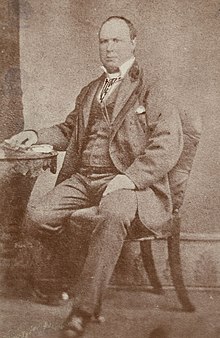Richard Pelham | |
|---|---|
 | |
| Born | Richard Ward Pell February 13, 1815
New York City, New York, United States |
| Died | October 1876 (age 61
≈) |
Richard Ward "Dick" Pelham (February 13, 1815 – October 1876), born Richard Ward Pell, was an American blackface performer. He was born in New York City.
Pelham regularly did blackface acts in the early 1840s both solo and as part of a duo or trio. His early performances were in the mould of Thomas D. Rice; he did song-and-dance versions of " Gumbo Chaff" and " Oh Pshaw!", among others. His brother, Gilbert Pelham, paired with him for part of his early career. The song " Massa Is a Stingy Man" became their trademark tune. Pelham was also a renowned dancer; by 1845, he was ranked so highly that William Henry Lane did an impression of him.
In 1843, Pelham became one of the founding members of the Virginia Minstrels, the first group to present a full minstrel show during a performance at the New York Bowery Amphitheatre on February 6, 1843. Through April 1843, he played tambourine as the Virginia Minstrels toured New York City and Boston. Pelham's style was something new for the time; in addition to traditional techniques, he played it like a drum. [1] Pelham and Frank Brower, who played the bones, were the first minstrel endmen, and greatly influenced the stereotype. Pelham's stage demeanor involved "looks and movements comic beyond conception. He seemed animated by a savage energy; and [the handling of his instrument] . . . nearly wrung him off his seat. His white eyes rolled in a curious frenzy . . . and his hiccupping chuckles were unsurpassable." [2] Pelham's signature non-musical bit was his "A Brief Battering at the Blues", a comic monologue and prototypical stump speech.
On April 21, 1843, when the group broke up. Pelham decided to settle in England. He briefly helped reform the Virginia Minstrels in the spring of 1844 when he met up with Brower and Joel Sweeney in Liverpool. The trio convinced Dan Emmett to rejoin, and the new ensemble played the Theatre Royal, Dublin, from April 24 to May 7 . They toured through June, then broke up again.
Over the next few decades, Pelham continued to perform, only now with British minstrel troupes. Pablo Fanque, one of Victorian England's most celebrated circus proprietors (later immortalized in The Beatles song "Being for the Benefit of Mr. Kite!"), helped popularize a Pelham sketch in England through performances at his circus in the 1860s. One of the most popular routines at Pablo's circus at Bolton in 1868 was Pelham's "Wha's Your Ticket?" in which an actor portrays "the character of a Negro engaged to collect tickets at a bal masque with express instructions to allow no one to pass without, but who by his blundering allows all to enter without that requisite." The sketch was described in 1859 as a "new afterpiece expressly imported from New Orleans by permission of R.W. Pelham Esq." The sketch was still being performed in England as a "laughable American sketch" as late as 1888. [3]
The huge success of a recent British tour by the African-American Master Juba may have adversely affected Pelham's career there as his performance suffered in comparison. [4] His final performance was on August 19, 1856. Richard Pelham eventually married an English actress. He died in or near Liverpool [5] in October 1876.
References
- Notes
- ^ Nathan 126.
- ^ 1846 review in England, printed in a pamphlet on the Ethiopian Serenaders. Pelham was playing bones in this concert. Quoted in Nathan 125.
- ^ Gretchen Holrook Gerzina, Editor, "Black Victorians-Black Victoriana" (Rutgers University Press: New Brunswick, NJ, 2003)
- ^ Pelham felt obliged to place a notice in The Times rebutting an unfavourable review in the Sunday Times the day before, from which he quotes, adversely comparing him with Juba: "Marylebone - Novelty and variety have certainly not been among the desiderata at this theatre of late, for no sooner are the talents of 'that eminent American tragedian' Mr. Buchanan withdrawn from these boards than that 'incomparable American wonder' Mr. R.W. Pelham appears thereon. He is described in the bills as 'the only true delineator of the slaves and free blacks that has ever appeared at any theatre in Europe or America' - pretty bold assertion this - and he has been playing the character of Sambo Hit-'em-Hard every night of the past week in a piece we believe, of his own compilation...we must observe that Mr. Pelham's entertainment and Mr. Pelham's acting were dry, tame and ineffective. His "cotton picking reel," as it was termed, was a very wretched imitation of Juba's style of dancing...". In his reply Pelham states that he "can prove by the American press the fact of his having danced before the public in his own style years before Juba was heard of." The Times, Monday, Oct 25, 1852; pg. 4; Issue 21255; col A
- ^ Births, Marriages and Deaths (United Kingdom) Oct-Dec 1876: PELHAM, Richard Ward...60...Liverpool: ref 8b. 97
- Sources
- Brodsky Lawrence, Vera (1988). Strong on Music: The New York Music Scene in the Days of George Templeton Strong. Volume I: Resonances, 1839 – 1849. The University of Chicago Press.
- Nathan, Hans (1962). Dan Emmett and the Rise of Early Negro Minstrelsy. Norman: University of Oklahoma Press.
- Stark, Seymour (2001). Men in Blackface: True Stories of the Minstrel Show. Xilibris Corporation.
- Wilmeth, Don B., and Miller, Tice L., eds. (1996). Cambridge Guide to American Theatre. New York: Cambridge University Press.
- American male dancers
- American male comedians
- 19th-century American male singers
- 19th-century American singers
- American male stage actors
- Blackface minstrel performers
- Blackface minstrel songwriters
- Male actors from New York City
- 1815 births
- 1876 deaths
- American percussionists
- 19th-century American male actors
- Comedians from New York City